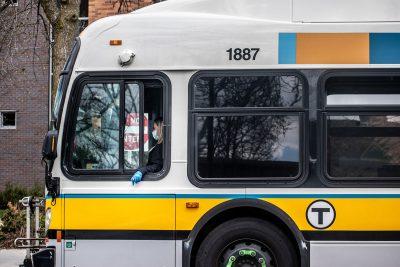
Federal money given to Boston for recovering from the COVID-19 pandemic could partially fund newly-elected Mayor Michelle Wu’s campaign promise to eliminate fares for some MBTA services.
The use of eight million dollars granted by the American Rescue Plan was discussed at a city council hearing Monday and is expected to be voted on Wednesday. In a letter to councilors before the meeting, Wu urged them to accept the funding in order to “address systemic public health and economic challenges that have contributed to the unequal impact of the pandemic.”
Vineet Gupta, director of planning for Boston’s Transportation Department, said at the hearing he hopes to launch free-fare pilot programs for Routes 23 and 29, while continuing the pilot program for Route 28.
“These routes form the backbone for bus riders in the Dorchester, Mattapan and Roxbury neighborhoods and are essential to their livelihood,” Gupta said. “Free fares will allow more affordable and better connections for opportunities whether you’re connecting to jobs, to community facilities or to education.”
The program was introduced originally by former Acting Mayor Kim Janey to make Boston more “equitable” because Route 28 connects through primarily low-income communities.
The transit program began a free-fare test run on Route 28 in August. Janey budgeted $500,000 toward making Route 28 free until Nov. 29. Since the trial period ran under budget, the program extended its free-fare for Route 28 until the end of December 2021 to spend the entire $500,000 originally budgeted.
“I’m excited about this and definitely in favor of passing the appropriation,” Kenzie Bok, District 8 City Councilor, said.
Using the Coronavirus State and Local Fiscal Recovery Fund, Wu and the Council propose expanding the free-fare program to include Route 23 and 29 for two years.
“The reason why we want to do a two-year pilot is, one, for it to have lasting economic benefits, but also to give us a time frame to do a very detailed evaluation of the program,” Gupta said. “Free fares will lessen riders’ financial burden at a time of high economic vulnerability as we recover from the pandemic.”
MBTA rider Marje Sammey, who rides the bus “all the time,” welcomes the expansion.
“I think it’s an excellent program because a lot of people can’t afford to go to work if they don’t have any transportation,” Sammey said. “Any more service would be great because I take certain buses and we need more services and in the neighborhoods, especially in the Black community, we need more busing.”
Other MBTA riders also cited a need for more busing.
“I think that they definitely should [provide free-busing],” MBTA rider and healthcare worker Delimar Negron said. “There’s just too many people [on the bus] and I feel like that would be a good benefit if they also get more buses on the route.”
Negron also voiced concerns about COVID-19 protocols on the bus.
“The buses are not operating how they should be when it comes to social distancing and stuff,” Negron said. “I go to Ashmont and every day, there’s no way I can get a seat or even [be] in [the bus] that I’m not like against the door.”
Despite the program’s benefits to riders, city councilors criticized the financing behind it at the meeting Monday.
“Everybody’s calling this free. It’s not free. This is a bill that’s going to chase us forever,” District 3 City Councilor Frank Baker said at the hearing.
Baker cited concerns over the sustainability of the fare-free program and questioned where the City of Boston will pull resources once the eight million dollar grant runs out in two years.
“In two years, when the [American Rescue Plan Act] money’s gone and we’re talking about expanding this program, there will be a line item in the city of Boston budget?” Baker asked. “Anybody else other than me have a problem with this?”
“There are budget constraints that we need to take into consideration in the future and that’s something we’re well aware of,” Casey Brock-Wilson, director of strategic partnerships for the Mayor’s Office, said at the hearing. “It’s going to take additional partners beyond the city to find a sustainable funding source.”
Other city councilors voiced concern over moving forward without more community engagement.
“I consider myself a very reasonable person and I was really surprised that the council was going to consider suspending and passing this without at least one hearing,” District 4 City Councilor Andrea Campbell said at the meeting. “These are COVID dollars, once-in-a-lifetime resources that the city will get. … Everyone should have an opportunity to weigh in on that.”
Campbell also felt the program did not use the funds in a way that will impact Boston sustainably.
“In the immediate, there are a lot of residents who are gonna benefit from this,” Campbell said, “but it’s not like, for example, building permanent housing where a resident would be housed in that for 20, 30, 40 years using COVID dollars.”
The Mayor’s Office and city councilors could not be reached for comment.
Looking forward to expanding the program past current plans, Gupta said at the hearing he sees a lot of leeway.
“There are some economies to scale,” Gupta said. “As more and more routes are included in the program, the cost should come down.”





















































































































